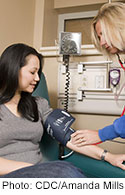- Could Your Grocery Store Meat Be Causing Recurring UTIs?
- Are You Making This Expensive Thermostat Error This Winter?
- Recognizing the Signs of Hypothyroidism
- 10 Strategies to Overcome Insomnia
- Could Artificial Sweeteners Be Aging the Brain Faster?
- Techniques for Soothing Your Nervous System
- Does the Water in Your House Smell Funny? Here’s Why
- Can a Daily Dose of Apple Cider Vinegar Actually Aid Weight Loss?
- 6 Health Beverages That Can Actually Spike Your Blood Sugar
- Treatment Options for Social Anxiety Disorder
Early Menopause Tied to Lower Risk of Irregular Heartbeat


Women who go through menopause at a relatively young age may have a slightly lower risk of developing a common heart rhythm disturbance, new research suggests.
The study, of nearly 18,000 middle-aged and older U.S. women, found that those who’d gone through menopause before age 44 were 17 percent less likely to have atrial fibrillation.
Atrial fibrillation is a common disorder where the heart’s upper chambers quiver chaotically instead of contracting in a normal rhythm. It’s not immediately life-threatening, but over time the condition can raise the risk of a stroke or heart failure.
The fact that earlier menopause was linked to a lower risk of the irregular heartbeat was “a bit surprising,” said lead researcher Dr. Jorge Wong, a fellow at Brigham and Women’s Hospital in Boston.
That’s because early menopause is actually connected to a heightened risk of heart disease — where plaques build up in the arteries and sometimes lead to a heart attack.
Since estrogen production drops after menopause, experts believe the hormone has a protective effect against heart disease, Wong said.
So why would earlier menopause potentially lower the risk of atrial fibrillation?
It’s not clear, according to Wong. But he said that, in general, the risk factors for heart disease and atrial fibrillation are complex — and “sometimes divergent.”
“We suspect the lower [atrial fibrillation] risk could be related to a woman’s total duration of estrogen exposure,” Wong said. “What’s really interesting is, this could give us clues to the mechanisms underlying [the irregular heart rhythm disorder].”
Wong was scheduled to present the findings Friday at the Heart Rhythm Society annual meeting, in Boston. Studies reported at meetings are usually considered preliminary until they are published in a peer-reviewed journal.
Because of that, the finding should be viewed cautiously, said Dr. Anne Gillis, past president of the Heart Rhythm Society and a professor of medicine at the University of Calgary, in Canada.
“The results are interesting, but it’s hard to interpret what the implications could be,” Gillis said.
For one, she pointed out, the study shows only an association between menopause timing and atrial fibrillation — and doesn’t prove cause-and-effect.
“Why did these women go through menopause at a younger age?” Gillis said. “Maybe there are additional factors that we don’t understand yet.”
Wong said his team accounted for the factors they could — including whether the women were overweight, had high blood pressure or diabetes, or used hormone therapy after menopause.
And there was still a connection between menopause timing and the irregular heartbeat. However, Wong agreed that more research is needed to verify that the link is real — and then to figure out why it exists.
Women cannot control the timing of menopause, of course. But if age at menopause is a factor in the development of atrial fibrillation, that might help doctors zero in on patients who are at relatively greater risk, according to Wong.
Gillis agreed. But for now, she recommended that women focus on known risk factors that can be changed — such as uncontrolled high blood pressure and diabetes. She also said women should tell their doctor about any heart palpitations, since that can be a symptom of atrial fibrillation.
Over 2.5 million Americans have the heart rhythm disorder, according to the Heart Rhythm Society. Besides palpitations, symptoms include chronic fatigue, shortness of breath, and dizziness or lightheadedness.
Treatment often involves drugs that control the heart’s rhythm and rate, and blood thinners to prevent blood clots and stroke.
More information
The Heart Rhythm Society has more on atrial fibrillation.
Source: HealthDay
Copyright © 2026 HealthDay. All rights reserved.










